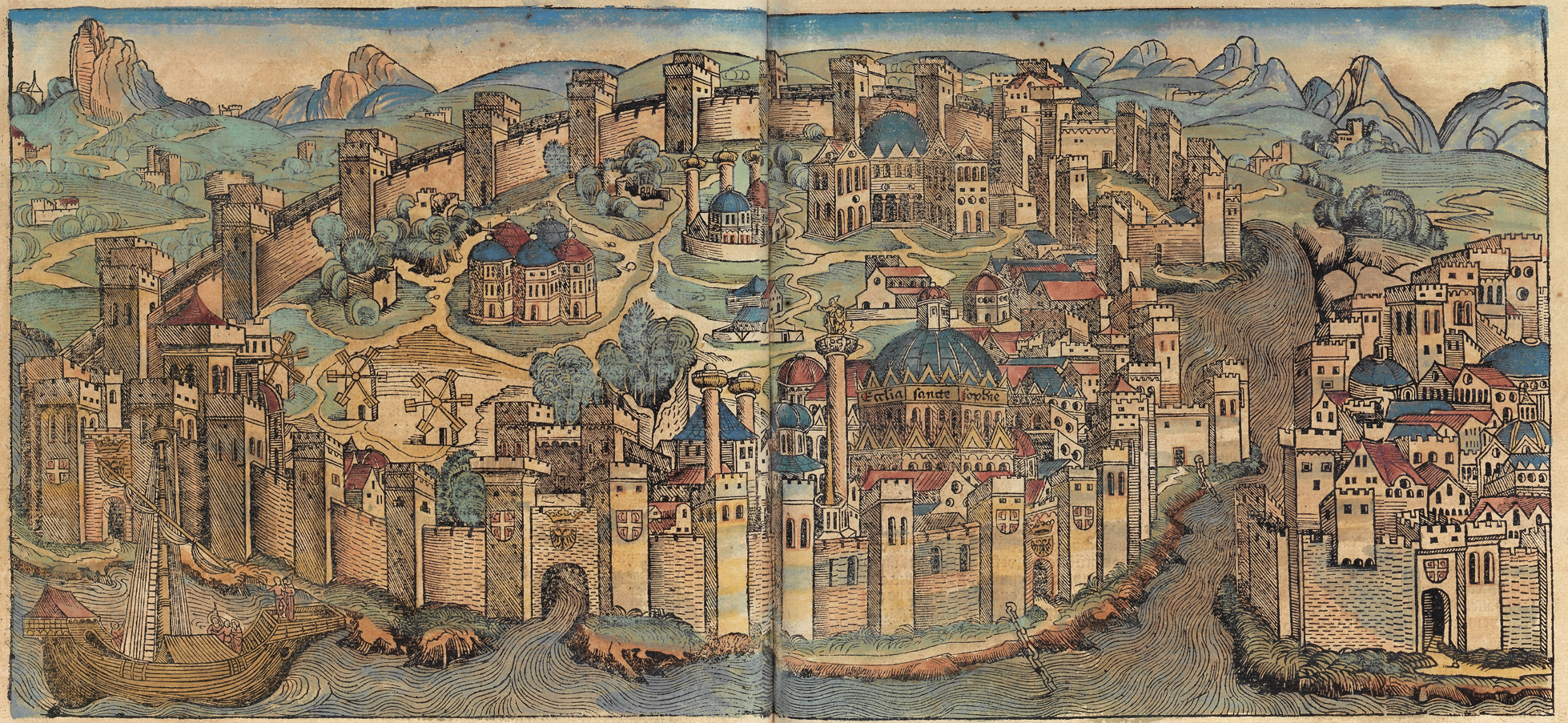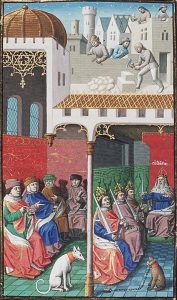
330 AD to 350 AD, Psalm 64: Constantinople.
This site was first built in French (see www.147thgeneration.net). The English translation was mainly done using « google translation ». We have tried to correct the result of this translation to avoid interpretation errors. However, it is likely that there are unsatisfactory translations, do not hesitate to communicate them to us for correction.
(for that click on this paragraph)
Summary
This generation is from the years 330 AD to 350 AD.
According to our count, this generation is the 64th generation associated with Psalm 64. It is in this Psalm 64 that we therefore find an illustration of the facts of this generation.
This generation includes the end of the reign of Constantine (until 337) and the power shared between these two sons up to 350: Constant in the West and Constance II in the East (who will be alone in ruling the entire empire of 350 at 360). At this generation begins with the official birth of Byzantium becoming the new Rome.
Constantine at the end of his reign breaks with the policy of tolerance towards the Jews. He does not alter traditional politics, which tolerates the worship of Jews and grants privileges to their priests. Freedom of propaganda for Christianity, official protection for converted Jews, and for Judaism absolute prohibition to spread: already theoretical equality tends to give way to a flagrant inequality of fact.
This Constantinian law is followed by a whole series of other measures, which continue until the writing of the Theodosian Code. They tend, on the one hand, to nullify the possibilities of action of the Jews on gentiles, pagan and especially Christians, and consequently to limit them to their particular situation, outside the framework of society; on the other hand, as there is no hope of a massive and spontaneous conversion of Israel to the Christian faith, they aim to further accentuate the exceptional character of Jewish status, but in such a way that it loses its privileged aspect and appears more and more like a charge, a divine punishment weighing on a class of reprobates.
Talk
Byzantium
This generation includes the end of the reign of Constantine (until 337) and the power shared between these two sons up to 350: Constant in the West and Constance II in the East (who will be alone in ruling the entire empire of 350 at 360). At this generation begins with the official birth of Byzantium becoming the new Rome.
Marginalize the Jews

Constantine at the end of his reign breaks with the policy of tolerance towards the Jews:
- Constantine [1] does not alter traditional politics, which tolerates the worship of Jews and grants privileges to their priests. However, towards the end of his reign, he was concerned to protect Jewish converts to Christianity from the reprisals of their former fellow Jews and forbade Jews to circumcise their Christian slaves.
By adopting Christianity as an official religion, Constantine initiates a slow but inexorable process of marginalization of the Jews:
- One [2] of the first measures of Constantine after his victory over Maxence aims at the repression of proselytism. It is not yet, strictly speaking, a substantial change in the traditional (Jewish) status, since propagandist activity had never been explicitly recognized as a right of the Jews; she was tolerated, not allowed. But it is clear that this formal measure responds to religious and not political motives. It tends to suppress dangerous competition for the Church. The context of the ban is significant. It constitutes, in fact, the second part of a law whose first object is to protect against the abuse and the reprisals of their former co-religionists the Jews, come to Christ. Freedom of propaganda for Christianity, official protection for converted Jews, and for Judaism absolute prohibition to spread: already theoretical equality tends to give way to a flagrant inequality of fact.
- This Constantinian law is followed by a whole series of other measures, which continue until the writing of the Theodosian Code. They tend, on the one hand, to nullify the possibilities of action of the Jews on gentiles, pagan and especially Christians, and consequently to limit them to their particular situation, outside the framework of society; on the other hand, as there is no hope of a massive and spontaneous conversion of Israel to the Christian faith, they aim to further accentuate the exceptional character of Jewish status, but in such a way that it loses its privileged aspect and appears more and more like a charge, a divine punishment weighing on a class of reprobates.
- The evolution will be accentuated after this period (from 135 to 425). It will eventually lead to the ghetto. But from the fourth and fifth centuries it was to the inner life of Judaism itself and no longer simply to those relations with the outside that control and restrictions tend to apply. And this at the same time because theology demands that the Jews bear the penalty for their infamy, and because their contact appears to be dangerous for the faith, often still unstable, of Christians.
- The measures of Christian slaves in the service of the Jews, and mixed marriages, have the double object of suppressing indirect forms of proselytizing and accentuating Jewish isolation.
The new relationship between the world (the Roman Empire) that became Christian and the Judaism that really begins in this generation are perfectly summarized in the psalm of this generation:

- For the conductor, a song of David.
- Hear, O God, my voice in my prayer; from fear of the enemy You shall guard my life.
- David expresses his fears for the new Christian empire that is born.
- You shall hide me from the counsel of evildoers, from the gathering of workers of iniquity,
- Who whetted their tongue like the sword; who aimed a bitter word like their arrow,
- To shoot at the innocent in secret places; they shoot at him suddenly and do not fear.
- Until now Christianity was a dissident religion often opposed by previous Roman emperors. The anti-Jewish attacks were then reduced to theological battles. Now that Christianity has passed from the « good side of the scepter » permanently, its attacks give rise to political attacks putting the Jewish community in real danger.
- They strengthen the evil word for themselves; they tell to hide snares. They say, « Who will see us? »
- They seek pretexts; they have completed a diligent search, hidden within man and in the depths of the heart.
- Sure of their power, it is without fear that he thinks he can attack the seemingly helpless Jews for the rest of the night. We have enough perspective today to measure the results of this slowly elaborated plan of Jewish marginalization.
Empire converted to heresy
However, in this unfavorable context, the Jews paradoxically find comfort:
- The adherence [3] to Constantine’s Christianity, which would become, eighteen years later, the undisputed ruler of the empire, was to have a decisive influence on the culture and character, political and religious, of Palestine. The local rabbis, whose real reactions to this great transformation did not reach us, found some consolation in this change, and the form of their expectations of imminent salvation adapted to the new circumstances. The support of an official figure as important as Constantine foreshadowed the Christianization of the entire empire. In their hearts, this was the historical and theological dilemma that the rabbis faced: when Rome converted from paganism to Christianity, should they view the Christian empire as a new entity or simply as a mutation of the old system? If the last hypothesis were right, faithful to their own affirmation of redemption would come when « the empire will fall (it) into heresy » (Mishnah Sotah 9,15), salvation was near. As a result, a contemporary sage reformulated this point in the eschatological schema of the « End of Days »: Rabbi Isaac says: « Until all the empire is converted to heresy » (Talmud of Babylon, Sanhedrin, 97a ). By this textual correction, not only was the estimated date of the End of Days set back, but paradoxically the Jews allied themselves with the Christians to hasten the transformation, certainly for contrary reasons.
It is on this unswerving hope for the final redemption of the Jewish people, whose nations who have largely adhered to monotheism (Christianity and Islam) can only recognize, that David concludes his psalm:

- And God cast them down; their wounds were [like] a sudden arrow.
- That which they hoped would make him stumble, their tongue brought upon them; all who see them will shake their heads.
- Then all men feared, and they declared the work of God and understood His deed.
- The righteous will rejoice with God and take shelter in Him, and all upright of heart will boast.

[1] Pierre Maraval: « The Christianity of Constantine to the Arab conquest » / Chapter: « The religious policy of Constantine to Heraclius and barbarian kings ». (French: « Le Christianisme de Constantin à la conquête arabe »/Chapitre : « La politique religieuse de Constantin à Héraclius et des rois barbares » (p11) ).
[2] Marcel Simon: « Verus Israel » / Chapter: « Rome, Judaism and Christianity ». (French: « Verus Israël »/Chapitre : « Rome, Judaïsme et Christianisme » (p156/157) ).
[3] David Biale: « The cultures of the Jews »/ Chapter: « Confrontation with a Christian empire: Jewish culture in the Byzantine world » (by Oded Irshaï). (French: « Les cultures des Juifs »/Chapitre : « Confrontation avec un empire chrétien : La culture juive dans le monde byzantin » (par Oded Irshaï)/(p194 – version originale :184/185) ).
